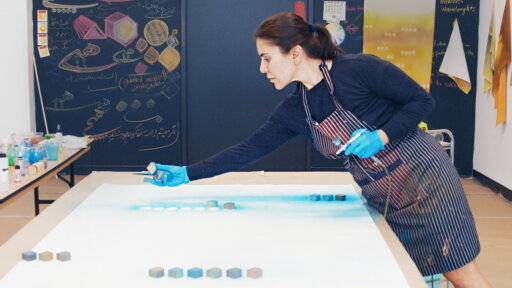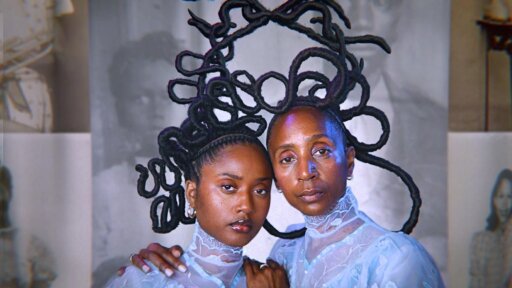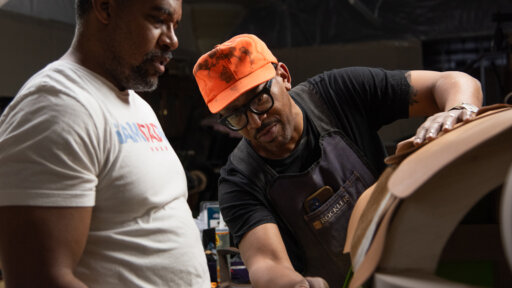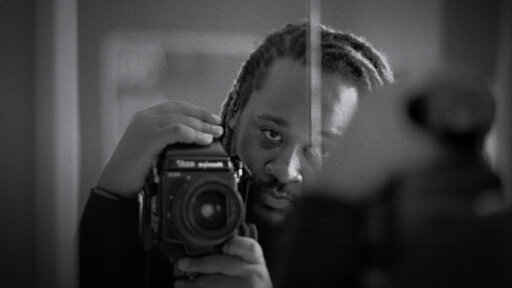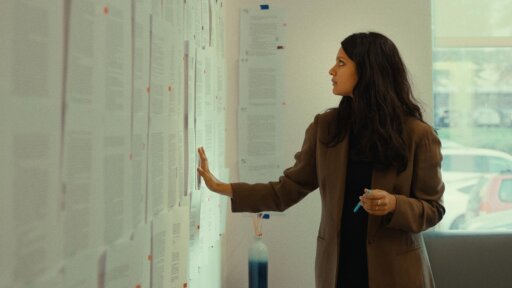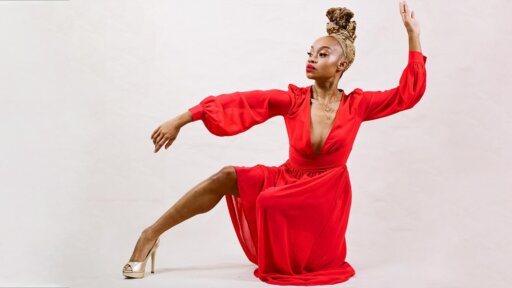TRANSCRIPT
(flame roaring) ♪ Didn't even know it ♪ ♪ Didn't even know it ♪ - [Danielle] When I go into my studio most times, I don't go in with an idea of what I want to do.
So I take up a space for myself to sit still, to ground myself.
(warm guitar music) I sit in that spot, actually, until something hits me.
Some people don't believe in spirits.
I believe in them.
I am this type of person where I feel them, I sense them.
I don't hear them, but I know they're there, and they're present in my studio with me.
♪ It was all gonna come ♪ - My name is Danielle Scott.
I am a storyteller, I am a mother, I am a teacher, a mentor, and I am a mixed media assemblage artist, trying to be a voice of those who have passed away and their stories and voices have not been heard.
(gentle vocalization music) (object tapping rhythmically) - [James] If you don't know where you came from, then you don't know where you are, and you can't find out where you're going.
♪ They didn't even know when I'll be ♪ - [Danielle] When I think of telling stories I think of the many stories that are hidden, because the truth is something that makes people uncomfortable.
(ethereal vocalization music) (paper rustling) When I first started off as an artist, I played it very safe with oil paintings.
But when I went back home to Cuba, I realized that a lot of Afro-Cuban artists, they create with no boundaries.
I walked around and I was like, oh my god.
The things that the artists are collecting and putting together are things that I'm actually, I have it in my sketchbook, I have it in my studio.
And that's what made me start thinking.
Why am I hiding what I actually want to say?
And it's something in me that's telling me to say it.
The way in which I pick archival images is I can look through 1,000 images, but some of them pick me.
So when they call me is when I say, "Okay, let's honor you and who you are, and actually gather as much information I can about you to share with the world."
So now I'm combining the archival work with my oil paintings and it's starting to make sense.
It took time for those to grow together.
I am an artist, but I'm also loving that I'm becoming an historian.
"Because of Them," the series that I'm gonna be putting together, I had to think to myself, this actual series is bigger than me.
The painting will have a cotton field at the bottom.
So you see me starting to put in the cotton field.
But behind it you see all of the names of everyone who picked cotton, how old they were, how much they picked that day, if they actually ran away, if they were sick.
Three years ago, I went to a plantation in Mississippi, and I decided I wanted to pick cotton.
And I wanted to pick cotton 'cause I want to root myself in what is still there and feel it.
And that day I made a promise and I said, "I'm gonna continue to return."
♪ Make the wounded whole ♪ ♪ Sometimes I grow discouraged ♪ - [Danielle] I knew I was never alone on the cotton-picking field.
They were watching, they were speaking to me, they were talking to me, and I could feel it as I walked the fields, as I picked up cotton.
They're still there.
♪ I got a cross ♪ ♪ You've got a cross ♪ ♪ All of God's children got a cross ♪ ♪ When I get to Heaven gonna lay down ♪ - [Danielle] I don't think we can escape inter-generational trauma and what families have experienced, and what has been passed on.
♪ Everybody talkin' 'bout Heaven they goin' there ♪ - I think my way of not thinking of it as trauma is kind of to bring light to it, to embrace it, and also to celebrate it in a different way.
- Hi, my name is Eden Jusma, I'm Danielle Scott's daughter.
- [Danielle] And it's top and bottom?
- [Eden] This one's for the bottom because - [Danielle] That's the bottom, okay.
I think this looks good, I love the pattern of it, and it looks like the clothes that they used to wear actually, but we're just changing what the bags look like so they can represent people more so than an actual cotton-picking bag.
- We are collaborating by making cotton-picking bags.
They are children's size specifically, just because they wouldn't have been automatically seen as being on the field, but they were on the field from ages six.
They were on the field the rest of their lives from then.
- [Danielle] When I think of my process of being I think of they didn't do it alone.
They did it as a community.
They built a community, they worked together.
So this series, I'm collaborating for the first time with my daughter.
(sewing machine whirring) The bags themselves were nine feet.
You had to pick up to 120 pounds of cotton, sunup, sundown.
Children started picking cotton at the early age of six years old.
This actually looks like a person.
The sad part of it is, if they couldn't pick their weight...
These are the actual scales.
...they, of course, were going to get whipped.
(understated guitar music) - I'm Jacob Jusma, son of Danielle Scott.
In the art piece, "They Don't Know Who We Be," it was a piece after a lot of people of color were getting shot at a certain time, still are actively today.
My mother took a picture of myself and I held a, kind of like a cue card in front of me that said, "Son, student, brother."
Where people can see that I'm more than just like the average statistic.
- Why are you afraid of them?
Why are you turning corners?
Why are you crossing streets?
Why are you going the other way?
When does that change for us?
Why can't we just be seen as who we are and not just be seen for this?
(packaging rustling) My grandmother loved, loved roses, so she's being adorned with the roses.
I'm identical to her in so many ways, in the way that I look, my mannerisms.
And... about 11 years ago, I was diagnosed with a disease called keratoconus, so I am legally blind.
I have corneal transplants in my eyes because of the disease.
So without contacts, I can't see anything.
I can see color a little bit, but I can't see anything very close or far to me.
(singer singing in foreign language) - I just can't see, I can't see the colors.
That might be it, what I need.
Yeah.
In me getting diagnosed with keratoconus, the eye doctor asked me to start doing my ancestry and he said, "A lot of my Asian patients and I think you should look up your history."
We started to pick up on a lot of things, and if you look at my grandmother and a lot of my cousins, we notice these things.
And because of slavery, you actually don't know where you're from, who could be your ancestor, your grandmother, your grandfather.
So this piece is my Polish-Jewish grandmother and she married my Afro-Cuban grandpa.
(nostalgic music) My grandmother was kicked out of her family for loving a man who was not Jewish and who was a man of color.
So they took over the house that my great grandpa owned in Jersey City, and that's where they raised their children.
It's one of my favorite images actually, of my mom.
That's me, and at the time I was going to Public School number 28 in Jersey City.
I wasn't born with a silver spoon, but I was born with, like my mom says, a lot of wisdom.
I would find anything and everything to draw with, so I would draw all over the walls.
And then finally my mom went and bought butcher paper from the bodega and I started to draw on the butcher paper.
And I was one of those kids that was distracted, and I would start like bothering people.
And the art teacher, she tested me, and I did this drawing, and I was accepted into the artistically talented class.
(gentle music) This is the first ever article written on me.
So I was in The Star-Ledger in high school, and during this time, actually, when this was written, my painting that I did caused a lot of controversy.
They didn't really want it there, but we got it to the Capitol.
(birds chirping) I learned what family is by growing up in the projects.
I learned that you don't have to be blood-related to be cared for.
I learned stories there.
I learned from the elders.
I learned the stories from the elders.
And I think that's why I'm a storyteller now because it is something that I enjoyed.
I love that, I love hearing it and experiencing that.
♪ We live our lives on stages ♪ ♪ Wondering what is going on ♪ - So I try to surround myself in my studio with things that inspire me.
(chains clanking) These are things from my trip to Angola.
(water rushing) Angola was one of the most spiritual I was there for three months, researching trans-Atlantic slave trade.
♪ I keep on going forward ♪ ♪ Wondering what life's really all about ♪ - The universe conspired in bringing Danielle and I together to collaborate with this song called "Ships on the Horizon."
♪ Like the sun in Africa ♪ I was in Angola and I wrote this song in honor of the women who were there before their freedom was taken away.
Danielle came up to me after I performed it and she said, "I have an exhibit coming up called 'Ancestral Call,' and I would love to have this song be featured."
And I said, "Absolutely."
("Ships on the Horizon" by Janétza Maria Miranda) - I actually cried in the arms of one of the people at the village, the fisherman.
♪ Did you know that they were baptized ♪ - They welcomed me into their home, and I got to touch this washboard.
I was so used to seeing washboards on plantations, then I actually got to see this washboard in the village.
And the mom was speaking to me in Portuguese.
And as she was speaking to me in Portuguese, the dad touched my head and he went like this, and he said something in Portuguese, and I listened.
And I actually started picking up what he was saying in Portuguese.
♪ All of their loved ones screaming ♪ ♪ Praying for repentance of sin ♪ - Janétza said, "You do know what he's saying?"
And he was saying, "Your spirit has been here before."
♪ Little did they know that they are ♪ ♪ Far more sacred than all of them ♪ - Why does our history matter today?
Because this country was built on our history, so you cannot erase it.
You cannot erase the impact that our history has on America today.
And I know a lot of people say, "Get over it.
Why are you speaking about it?
Why are you still talking about it?"
Because it's still a part of us, we haven't moved forward.
And I'm not just talking about people of color, I'm talking about everyone that I stand for as the person that I am and where I come from.
♪ Trying to find us ♪ ♪ Trying to find us ♪ - I want my work to live on, way past my time on the universe.
I want my work to be viewed 30 years from now, 40 years from now, 100 years from now.
And I want people to say, "Wow, she was telling us something and making us aware of something, and she wasn't afraid to do it."
(Janétza vocalizing) (slow, contemplative music) - [James] If you don't know where you came from, then you don't know where you are, and you can't find out where you're going.
(slow, contemplative music continues) (no audio) (clapper claps) (clapper claps)

